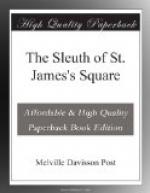The old Count, his chin up, his withered, yellow face vitalized, lifted his hands like one before something elevated and noble. After some moments had passed he continued:
“On the following day the assassin was captured in a neighboring village. Feeling ran so high that it was with difficulty that the officers of the law saved him from being lynched. He was taken about from one prison to another. Finally he was put on trial for murder.
“There was never a clearer case before any tribunal in this world.
“Many witnesses identified the assassin — not merely English-speaking men, who might have been mistaken or prejudiced, but Austrians, Poles, Italians — the men of the mines who knew him; who had heard him cry out the fatal Italian word; who saw him following in the road behind his victim on that Sunday afternoon of summer; who knew his many names and every feature of his cruel, degenerate face. There was no doubt anywhere in the trial. Learned surgeons showed that the two wounds in the dead man’s back from the big-calibered weapon were deadly, fatal wounds that no man could have survived.
“There was nothing incomplete in that trial.
“Everything was so certain that the assassin did not even undertake to contradict; not one statement, not one word of the evidence against him did he deny. It was a plain case of willful, deliberate and premeditated murder. The judge presiding at the trial instructed the jury that a man is presumed to intend that which he does; that whoever kills a human being with malice aforethought is guilty of murder; that murder which is perpetrated by any kind of willful, deliberate and premeditated killing is murder in the first degree. The jury found the assassin guilty and the judge sentenced him to be hanged.”
The Count paused and looked at his companions about him on the terrace.
“Messieurs,” he said, “do you think that conviction was just?”
There was a common assent. Some one said: “It was a cruel murder if ever there was one.” And another: “It was wholly just; the creature deserved to hang.”
The old Count bowed, putting out his hands.
“And so I hoped he would.”
“What happened?” said the American.
The Count regarded him with a queer, ironical smile.
“Unlike the great British people, monsieur,” he replied, “your courts have never given the pig, or the pasture on which he gathers his acorns, a consideration above the human family. The case was taken to your Court of Appeals of that province.”
He stopped and lighted his cigarette deliberately, with a match scratched slowly on the table.
“Monsieur,” he said, “I do not criticize your elevated court. It is composed of learned men — wise and patriotic, I have no doubt. They cannot make the laws, monsieur; they cannot coin a conception of justice for your people. They must enforce the precise rules of law that the conception of justice in your country has established.




